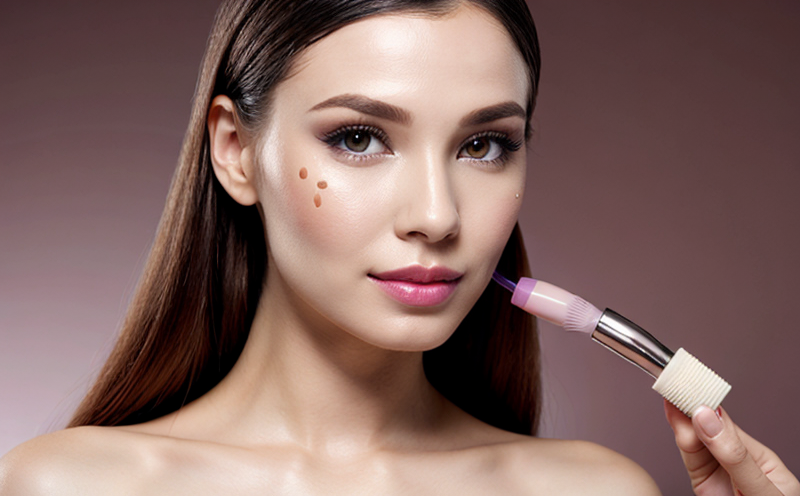In Vitro Safety Testing for Sunscreen Filters
As the global demand for safer and more effective sun protection products grows, the importance of rigorous testing cannot be overstated. In vitro safety testing represents a significant advancement in ensuring that sunscreen filters are not only efficacious but also safe for consumers. This method uses biological cells, tissues, or other non-animal models to assess potential hazards without harming living organisms.
The primary goal is to identify any toxicological risks associated with the active ingredients used in sunscreens before they reach the market. By leveraging advanced scientific techniques and technologies, our laboratory offers comprehensive testing services that comply with international standards such as ISO 10993-5:2016 and ASTM F878-18.
This approach ensures regulatory compliance while also addressing ethical concerns related to animal testing. The process involves several key steps including specimen preparation, exposure simulation under controlled conditions, and subsequent analysis of biological responses. Our experienced team employs state-of-the-art equipment and software to conduct these tests accurately and efficiently.
One major advantage of in vitro testing is its versatility; it can be applied across various types of sunscreen formulations from lotions to sprays. Additionally, this methodology allows for rapid turnaround times compared to traditional animal studies, enabling faster product development cycles. However, it's important to note that while highly effective at detecting certain potential issues early on in the pipeline, some limitations may still exist regarding broader long-term effects.
At our facility, we pride ourselves not only on delivering accurate results but also on providing valuable insights into how each ingredient interacts within a given formulation. This knowledge is crucial for formulators aiming to create innovative yet safe products that meet both consumer expectations and legal requirements worldwide.
Why It Matters
In vitro safety testing plays an indispensable role in safeguarding public health by ensuring that sunscreen filters do not pose any undue risks when applied. Consumer trust is paramount, especially given increasing awareness about the environmental impact of certain chemical compounds found in many conventional sunscreens.
By adopting this cutting-edge technology, manufacturers can demonstrate their commitment to sustainability and safety at every stage of product development. Regulatory bodies like the European Union’s Cosmetics Regulation (EC 1223/2009) have mandated specific tests for new active ingredients entering the market, further emphasizing the necessity of thorough preclinical evaluation.
The benefits extend beyond mere compliance; successful implementation of these practices can enhance brand reputation among eco-conscious consumers who increasingly seek out green alternatives. Moreover, early detection of problematic components allows companies to make informed decisions about reformulation, thereby reducing unnecessary costs associated with recalls or product withdrawals later down the line.
Customer Impact and Satisfaction
Our clients benefit significantly from our robust in vitro safety testing services. For quality managers responsible for overseeing various stages of production, having access to reliable data early on helps streamline decision-making processes related to formulation adjustments or sourcing alternatives.
Compliance officers appreciate knowing that they are fulfilling all necessary requirements efficiently and effectively, thus avoiding potential delays due to non-compliant submissions. R&D engineers gain valuable insight into which active ingredients perform best under different conditions, facilitating innovation efforts aimed at developing next-generation products.
From a procurement perspective, suppliers can feel confident about the integrity of raw materials used in their supply chains knowing that they have undergone stringent quality assurance procedures. Ultimately, satisfied customers reap the rewards of safer, more effective sun protection offered by high-quality formulations supported by comprehensive testing protocols.
International Acceptance and Recognition
- ISO 10993-5:2016 – This standard specifies the requirements for in vitro biocompatibility tests on medical devices, which have been adapted for use in evaluating sunscreen filters.
- ASTM F878-18 – Developed by the American Society for Testing and Materials, this guideline provides procedures for conducting allergenicity assessments using human keratinocyte cultures.
- OECD Guidelines for Testing of Chemicals – Several OECD guidelines recommend in vitro methods as alternatives to traditional animal testing, including OECD 431 for dermal irritation potential assessment.
- European Union Cosmetics Regulation (EC 1223/2009) – Mandates certain types of safety assessments prior to placing sunscreens on the market within EU member states.





